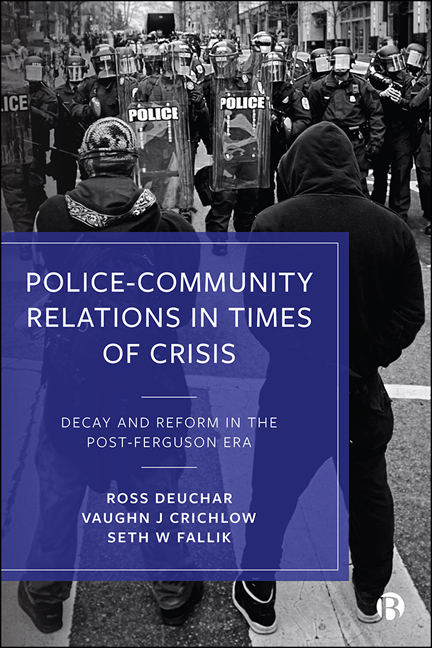3 - The “Ferguson Effect” and Emergence of “De-policing”
Published online by Cambridge University Press: 21 December 2021
Summary
The confidence crisis of law enforcement is steeped in conflict and has caused great harm to the police and public. We are, unfortunately, in a period of continued decline marred by public inquiries into procedural justice and the questioning of law enforcement legitimacy. In this chapter, we report on the rise of a somewhat new phenomenon in policing. In doing so, contemporary policing is framed among developing countermovements that place law enforcement in the middle of oppositional belief systems. Against a backdrop of historical inequalities and a lack of law enforcement accountability, we consider the way some have questioned if the public are engaged in a “war” on police. We explore how public discord has had real consequences and been met with a somewhat galvanized de-policing response from law enforcement. The policing and crime costs of the Ferguson Effect, as this phenomenon is also known, are empirically explored. Though often framed through the words and lens of law enforcement, the semistructured interviews (of officers listed in Table 3.1) and participant observation field notes set the stage for alternative perspectives shared in later chapters.
The emergence of countermovements
Criticisms of police have occurred during a broader period of social and political unrest in the US. In fact, there has been an emergence of countermovements. The BLM movement, for example, was initially criticized for lacking inclusivity. While few questioned the experiences of Blacks with the police, many other groups have also been subjected to systematic police abuses. In particular, and following the terrorist attacks on September 11, 2001, Muslim, Arab, and Middle Eastern populations in the US experienced additional scrutiny (and at times harassment) from law enforcement (Fallik & Novak, 2013). This led Withrow to state that, “after 9/11 the rules changed and everything we had learned about the social costs and ineffectiveness of racial profiling was largely ignored” (Withrow, 2006, p 244). Concern over terrorism led the US DOJ to pressure state and local law enforcement agencies to enforce immigration laws. To this point, Nguyen stated that the border became, “a critical front in the war on terror” (Nguyen, 2005, p 92).
- Type
- Chapter
- Information
- Police-Community Relations in Times of CrisisDecay and Reform in the Post-Ferguson Era, pp. 37 - 56Publisher: Bristol University PressPrint publication year: 2021

